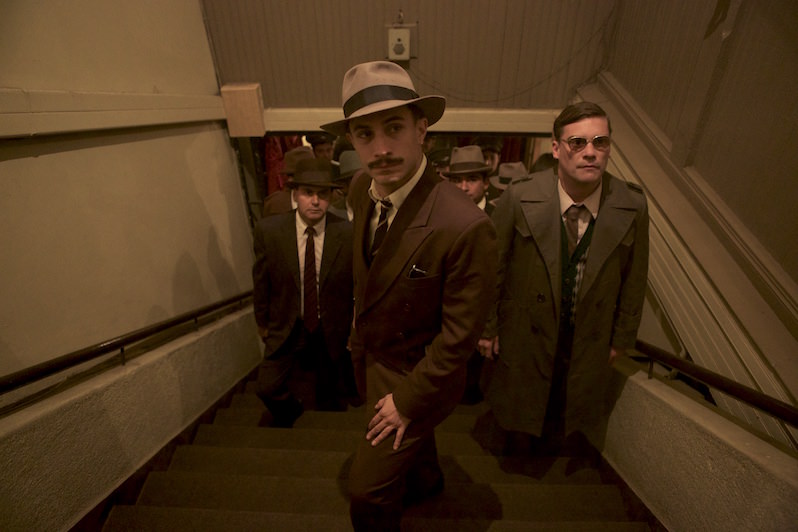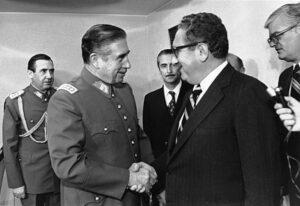‘Neruda’ Makes Poetry of a Cat-and-Mouse Tale
The film, nominated for a Golden Globe, follows Chile’s world-renowned Communist poet as he lives a colorful life on the run from an ambitious and mysterious cop.
Gael Garcia Bernal (center) plays police inspector Oscar Peluchonneau, hot on the trail of poet Pablo Neruda in Pablo Larrain’s new film about the Chilean literary icon. (The Orchard)
As impossible as it sounds today, imagine a poet more popular than a pop star, beloved enough to become a national icon.
Pablo Neruda was not just a Nobel Prize-winner but also a diplomat, egotistical snob and strident Communist leader, not to mention a lover of crime novels and loose ladies, as portrayed in director Pablo Larrain’s new movie, “Neruda.” The entertaining Golden Globe nominee for best foreign film is a clever, playful and, yes, poetic accounting of the literary icon’s run for his life from his home country of Chile.
When we first meet Neruda (Luis Gnecco), he is midcareer and world famous — perhaps too famous for the likes of Presidente Gonzalez Videla, who outlawed the Communist Party in 1948. Learning of a warrant for his arrest, Neruda takes a tip from his beloved crime novels and goes on the lam with his wife, artist Delia del Carril (Mercedes Moran), hiding out in basements in the port city of Valparaiso.
It was a fertile period for Neruda, who wrote much of “Canto General,” a collection of 231 poems, while in hiding. Irrepressible and irresponsible, he runs risks at the local brothel and eventually splits with Delia before escaping over the Andes.
That much is true. What’s invented (though not all viewers may know) is the subtle but ambitious police inspector Oscar Peluchonneau (Gael Garcia Bernal), who aims to trap Neruda in a game of cat and mouse.
With a ridiculous mustache and a spacey air, Bernal floats through the film as a man who is uncertain whose story he inhabits. His active inner life and poetic voice-over is are set against only a jot of Neruda’s verse, giving the impression that the policeman might be the movie’s more gifted bard. He might also be its protagonist, a role he strives for, attempting to reduce Neruda to the status of supporting player. Of course, he loses in the end, and the audience is left wondering if he ever existed or was just another invention of the poet’s imagination.
Bernal’s subtle but irresistible force is the perfect complement to Gnecco’s Neruda, an immovable object forced to move if he values his freedom. The Chilean actor adroitly embodies a broad talent and powerful intellect, treading the line between selfless man of the people and selfish man of privilege. So it comes as little surprise when he cannot answer an anonymous drunken comrade who points at him and asks the table, “When the revolution comes, will we all be equal to him or equal to me?”
Argentine actor Mercedes Moran brings dimension to the thankless role of Delia, a woman of privilege and a recognized artist in her own right who is overshadowed by her larger-than-life husband. Moran wordlessly imbues Delia with an inner life, illustrating her devotion to Neruda and the inevitable heartbreak that comes from loving someone who has moved on.
The ease with which director Larrain strikes a balance between Gnecco and Bernal is probably a result of the trio’s first collaboration, 2012’s “No.” Starting with Guillermo Calderon’s stimulating screenplay, Larrain proves to be an inventive visualist with “Neruda,” mixing postmodernist notions of narrative with classic film-noir style: employing limited camera movement, rear-projection screens and a desaturated palette to evoke an earlier era. His musical choices, including Charles Ives’ iconic “The Unanswered Question,” as well as variations on Edvard Grieg’s “Peer Gynt Suite 1,” underscore the vibe with dissonance and dread.
If you wind up seeing a movie by Larrain this season, it will probably be his more popular “Jackie,” starring Natalie Portman in a Golden Globe-nominated performance. Though the movies are different, both are portraits of characters in existential crisis, and both demonstrate the director’s considerable talent.
But only one offers poetry, passion and imagination, and that’s “Neruda.”
Independent journalism is under threat and overshadowed by heavily funded mainstream media.
You can help level the playing field. Become a member.
Your tax-deductible contribution keeps us digging beneath the headlines to give you thought-provoking, investigative reporting and analysis that unearths what's really happening- without compromise.
Give today to support our courageous, independent journalists.








You need to be a supporter to comment.
There are currently no responses to this article.
Be the first to respond.